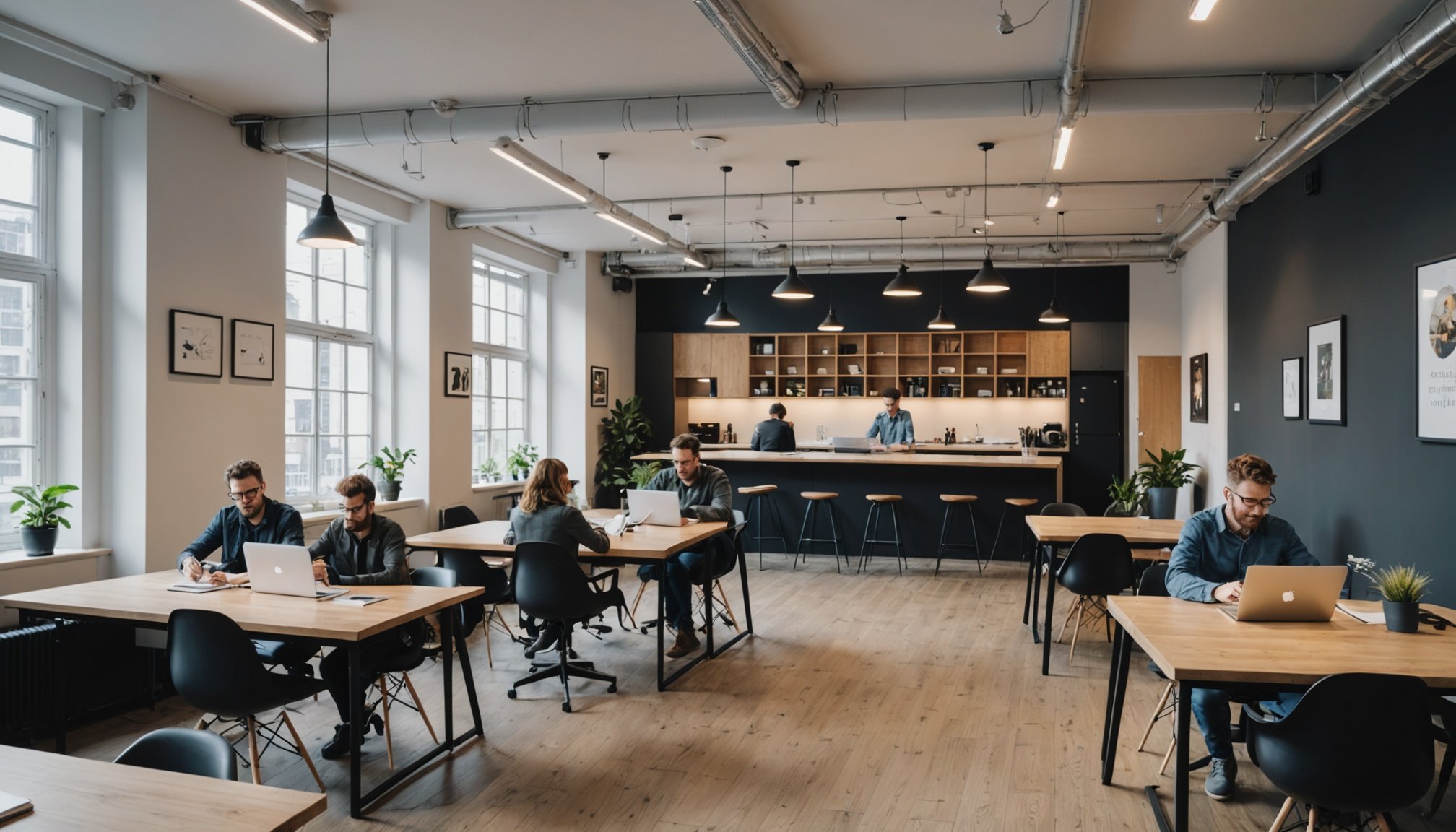Understanding the Co-Working Landscape for Tech Startups
Navigating the co-working spaces market in the UK can be complex for tech startups. It’s a dynamic field, constantly evolving to meet the needs of modern entrepreneurs. For UK tech startups, the choice of workspace directly influences business performance. With workspace trends shifting towards flexibility and collaboration, startups must adapt quickly.
The unique challenges of choosing a workspace are multifaceted. The location and amenities of co-working spaces significantly impact daily operations and team productivity. Furthermore, startups need to consider flexibility and the ability to scale the workspace as the business grows. A rigid, traditional lease might not be conducive to the fast-paced nature of tech ventures.
Also to read : Unveiling the Key Trends Steering the Future of Renewable Energy in the UK
A crucial factor is the importance of a supportive environment. Such a setting fosters startup innovation and aligns with the networking needs of tech entrepreneurs. In co-working spaces, startups find not only a physical space but also a community of like-minded innovators and collaborators. The communal atmosphere encourages exchange of ideas and collaboration, helping drive startup growth.
Key Considerations for Selecting a Co-Working Space
Navigating the selection of a co-working space involves analysing multiple factors imperative to the growth and success of your tech startup.
Also to read : Mastering AI Recruitment: Crucial Legal Tips for UK Companies to Thrive
Location
For UK tech startups, the location is crucial. Proximity to industry hubs and clients can provide networking benefits and ease of access for potential partners and employees. A central location can foster better connections and attract talent, enhancing collaboration.
Amenities
Essential amenities such as high-speed internet, meeting rooms, and recreational areas significantly impact productivity and team satisfaction. Startup teams often rely on these resources to conduct seamless operations and attract potential clients, so robust, reliable amenities are non-negotiable.
Flexibility
Flexibility in terms allows startups to adapt swiftly to changing needs, crucial for tech startups undergoing rapid scaling. Flexible leasing options provide the advantage to grow without the constraints of traditional office spaces. Being able to expand or downsize based on business demands without being tied to rigid contracts can be a decisive factor for many entrepreneurs seeking the ideal co-working environment.
Evaluating Networking Opportunities
For UK tech startups, the role of networking can be a game-changer in achieving growth. Co-working spaces often serve as networking hubs, offering valuable connections within the tech ecosystem. These spaces provide access to other entrepreneurs, mentors, and potentially pivotal business partners, facilitating collaboration and innovation.
When assessing co-working spaces, identifying spaces with active communities is essential. A vibrant community often indicates opportunities for knowledge-sharing and collaborative projects. Engaging in spaces where events and meetups are hosted can lead to meaningful partnerships and funding opportunities.
The benefits of collaboration with diverse startups cannot be overstated. Interactions with startups from various industries can spark creativity and new ideas, promoting cross-pollination of skills and expertise. This diversity fosters a dynamic work atmosphere where exchanging insights can lead to unexpected synergies, driving startup growth forward.
In conclusion, choosing a co-working space with robust networking opportunities can significantly enhance a startup’s trajectory, providing a foundation for lasting partnerships and entrepreneurial success.
Comparing Different Co-Working Spaces
The landscape of co-working spaces offers a plethora of options for UK tech startups, necessitating careful comparison to find the most suitable workspace. One primary factor to consider is the key differences in services and facilities among various providers. It’s essential to evaluate whether the space aligns with your startup’s operational needs and culture.
When comparing, key metrics such as pricing, location, and flexibility should be at the forefront. Some co-working spaces might offer more affordable rates but compromise on location or amenities, which could impact accessibility and productivity. Conversely, premium providers might boast prime locations and superior facilities but come at a higher cost.
Factors influencing choice may also include the availability of niche-specific resources or support networks, particularly if your startup operates in a specialized tech field. Choosing a space with industry-specific networking opportunities can provide additional value.
To assist startups in making informed decisions, many platforms rank co-working spaces based on user feedback and startup-specific criteria. Consider these rankings as a starting point, but tailor your decision to align with your unique workspace dynamics and growth objectives.
Tips for Negotiating Co-Working Terms
Navigating the negotiation of co-working terms can be a strategic advantage for UK tech startups, offering opportunities to optimise costs and services.
Understanding Lease Agreements
Startups must scrutinize lease agreements to ensure flexibility aligns with expected growth trajectories. Key elements typically include rent responsibilities, service charges, and termination clauses. Knowing these beforehand empowers startups to identify hidden costs and negotiate terms that align more closely with their financial models.
Strategies for Better Deals
Leverage your startup’s potential for networking and innovation when negotiating for better conditions. Effective strategies include discussing scalable office options or trial periods to test the workspace environment. Pointing out how your startup can enhance the co-working community may also encourage favourable terms.
Leveraging Startup Status
Your startup status can be a bargaining chip in negotiations. Many co-working providers value the vibrancy young startups bring. Highlighting your role in the tech ecosystem can lead to beneficial accommodations like discounted rates or flexible renewal terms. Using your unique influence effectively can position you advantageously in the competitive co-working landscape.
Impact of Co-Working Environment on Startup Growth
The co-working environment plays a pivotal role in the growth of UK tech startups, with its impact felt across various facets of business operations. Collaborative workspaces are known to enhance team dynamics by fostering an atmosphere conducive to creativity and innovation. This is primarily attributed to the open layout and flexibility that encourages spontaneous interactions and idea sharing.
Workspace dynamics in co-working settings are distinct and diverse, providing startups the chance to interact with a wide range of professionals and industries. This diversity not only spurs creativity but also introduces different perspectives that can lead to innovative problem-solving approaches. For example, a tech startup might gain valuable insights by interacting with creators from the design industry, leading to improved product development.
Moreover, evidence suggests that productivity often sees a notable increase in collaborative spaces due to the motivational and energetic atmosphere these environments cultivate. Startups that choose the right co-working space can experience long-term benefits like sustained growth and innovation, attributed largely to the synergies and support networks available within such environments. Selecting a workspace that aligns with a startup’s values and growth objectives is thus essential for leveraging these advantages effectively.
Analyzing Case Studies of Successful Tech Startups
Exploring success stories of UK tech startups uncovers invaluable insights into the effective use of co-working spaces.
Case Study: Startup A
Startup A thrived by fully embracing the collaborative culture of their co-working space. They strategically selected a space renowned for its vibrant networking community. This environment enabled them to forge critical industry connections, accelerating development and market entry.
Case Study: Startup B
In contrast, Startup B focused on the unique amenities provided by their workspace. They leveraged advanced tech facilities and meeting areas to streamline operations, boosting team efficiency. By prioritising these resources, they enhanced client interactions, directly impacting their growth trajectory.
Insights from Multiple Startups
Several startups revealed common themes that contributed to their success. Prioritising flexibility in leasing terms allowed them to scale efficiently as their business demands fluctuated. Additionally, fostering collaboration with diverse industries sparked innovative solutions, showcasing the profound impact of a supportive co-working environment. These insights highlight essential strategies for startups looking to optimise their workspace choices for growth.











